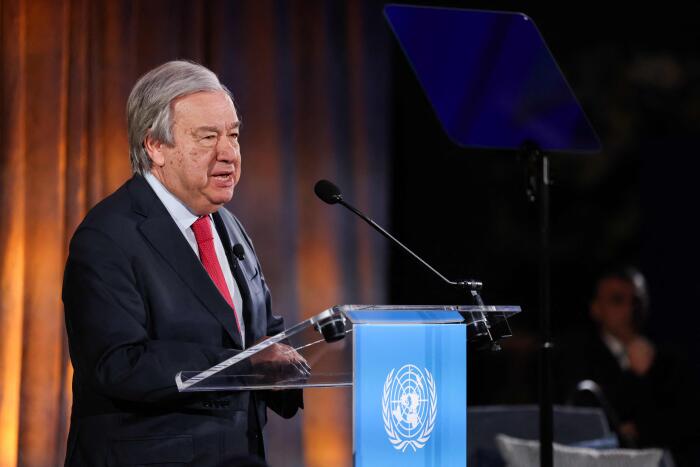It is now 80% likely that the global average annual temperature will temporarily cross the threshold of 1.5°C of warming for at least one of the next five years. The Secretary General of the UN, Antonio Guterres, calls for a start.
“We need to find an exit off the highway to climate hell. The good news is that we are the ones driving. » In a major speech, punctuated with his usual shock phrases, the Secretary General of the United Nations (UN), Antonio Guterres, hammered home the seriousness of the climate crisis and the urgency to act more ambitious, Wednesday June 5, during World Environment Day. “We are playing Russian roulette with our planet. Not only are we in danger, but we are the danger,” he insisted in front of an audience of politicians, business leaders and representatives of civil society gathered at the Museum of Natural History in New York, believing that “this is the moment of truth”.
Whatever figures or curves we look at, the indicators are all red. May 2024 is the hottest May on record globally since records began, the Copernicus Climate Change Service (C3S) announced on Wednesday. May thus continues a series of twelve consecutive months which have broken their own heat record, since June 2023.
Over the last twelve months, the global temperature has reached an unprecedented level, with 0.75°C above normal (1991-2020) and 1.63°C above the pre-industrial era. This streak is the second longest in records, following sixteen consecutive record months in 2015-2016.
A “shocking” but “not surprising” result, for Carlo Buontempo, director of C3S. “Even though this streak of record months will eventually end, the general signature of climate change remains and no signs of a change in this trend are in sight. We are living in unprecedented times,” he reacts. On Wednesday, an international study also showed that the rate of warming is faster than ever. Read also | Article reserved for our subscribers The rate of global warming is faster than ever Climate disruption is caused by the continued increase in greenhouse gas emissions linked to the combustion of fossil fuels (coal, oil, gas) and deforestation . To this long-term trend has been added in recent months the natural El Niño phenomenon, which has boosted global temperatures. It is currently ending, after having started in June 2023 and reaching its peak in December. This explosive cocktail has caused numerous extreme events around the world, whether deadly heatwaves in India, Pakistan or Mexico, floods in Brazil, droughts in southern Africa or even massive coral bleaching. of the world.
The end of extreme temperatures is not yet in sight. “The year 2024 is on track to be the hottest year on record, surpassing the record of 2023,” warns Zeke Hausfather, climatologist at the Berkeley Earth Institute. “It will undoubtedly be the first year to exceed 1.5°C of warming,” he adds, referring to the most ambitious objective of the 2015 Paris agreement. This overheating could be somewhat limited in 2025, with the probable arrival, in the second half of 2024, of a La Niña episode which should lower the global thermometer. “Considerable” damage to the environment But the general trend will remain towards warming, as confirmed by the forecasts published Wednesday by the World Meteorological Organization (WMO). It is now 80% likely that the global average annual temperature will temporarily cross the threshold of 1.5°C of warming for at least one of the next five years. This probability has continued to increase since 2015, when it was close to zero.
According to this report, between 2024 and 2028, the surface temperature is expected to exceed the reference period 1850-1900 by 1.1°C to 1.9°C each year. Furthermore, it is 86% likely that at least one of these years will become the hottest on record, thus dethroning the year 2023 – which was established at + 1.45°C compared to the pre-industrial era. From now on, there is even a one in two chance (47%) that the average temperature over the entire period 2024-2028 will exceed pre-industrial values by more than 1.5°C. A nurse treats a 76-year-old patient suffering from heat exhaustion, in a hospital in Ahmedabad (India), during a heatwave, May 25, 2024. AMIT DAVE / REUTERS “Behind these statistics lies a dark reality, we are far from achieving the goals set out in the Paris Agreement,” said Ko Barrett, WMO Deputy Secretary-General. The planet is heading towards warming of 2.5°C to 2.9°C by the end of the century. “We urgently need to make more efforts to reduce greenhouse gas emissions, otherwise we will pay an increasingly heavy price,” she adds, citing the millions of victims of climate extremes. , the “considerable” damage to the environment and biodiversity and the colossal economic costs. A new study published recently has significantly increased the cost of inaction, estimating that warming of 2°C by 2100 would lead to a drop in global gross domestic product of around 50%. “Set a real price on carbon” Scientists keep hammering it home: warming of more than 1.5°C risks making the consequences of climate change and extreme phenomena much worse, and every fraction of a degree counts.
“The difference between 1.5°C and 2°C is the difference between minimizing climate chaos and crossing dangerous tipping points,” recalls Antonio Guterres. Temporarily exceeding 1.5°C does not, however, mean that “the objective is definitively unattainable”, the latter referring to long-term warming over several decades. This battle “will be won or lost in the 2020s, under the gaze of current leaders,” warns Antonio Guterres. Everything will depend on the decisions that will be taken, or not, “in the next eighteen months”, until the climate conference (COP30) in Bélem (Brazil), in November 2025, which will mark the tenth anniversary of the agreement. of Paris and must see all countries submit new, much more ambitious climate plans. The States, currently meeting in Bonn (Germany), to prepare COP29 in Baku (Azerbaijan) in November, are supposed to start working on it. Read also | Article reserved for our subscribers Climate negotiations under pressure to help countries in the South The UN Secretary General has called on all countries to “considerably” reduce their emissions, starting with those in the G20, responsible for 80% of global carbon emissions. Antonio Guterres urges Organization for Economic Co-operation and Development (OECD) countries to end the use of coal by 2030 and reduce supply and demand for oil and gas by 60% by 2035, while continuing the development of renewable energies.
As for other states, they should put an end to new coal mining projects « right now », particularly in Asia, to exit them by 2040. Mr. Guterres also recalled the importance of massively increasing public and private financing to help the poorest countries, often heavily indebted, to adapt to climate change and carry out their ecological transition. But judging that these efforts will not be enough, he also wants to “set a real price on carbon” and tax the record profits of companies in the fossil fuel sector, described as “godfathers of climate chaos”. Finally, he asks advertising agencies and the media to refuse the campaigns of these companies, which practice “uninhibited greenwashing”, as was the case for those of the tobacco industry a few decades ago.




